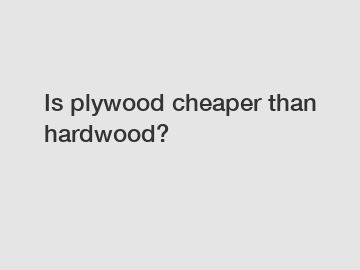Is plywood cheaper than hardwood?
Is Plywood Cheaper Than Hardwood?
Plywood and hardwood are two popular options for construction and furniture making, each with its own unique qualities. However, when it comes to cost, is plywood really cheaper than hardwood? In this article, we will delve into the topic and explore the factors that contribute to the pricing differences between these two materials.
1. Material Composition:

Plywood is made by gluing thin layers of wood veneers together, typically with a core of softwood or hardwood. On the other hand, hardwood refers to wood derived from deciduous trees such as oak, maple, or cherry. Due to the manufacturing process involving layers and a core, plywood is generally less expensive compared to solid hardwood.
2. Plywood Grades:
Plywood is classified into different grades based on its appearance and quality. These grades range from A to D, with A-grade being the highest quality and D-grade being the lowest. A-grade plywood is typically more expensive due to its smooth surface and absence of knots. However, lower-grade plywood can still be suitable for certain applications, such as temporary structures or interior projects where aesthetics are not crucial.
3. Hardwood Species:
When comparing the pricing of hardwood, it is important to consider the specific species. Different hardwood species vary in availability, demand, and cost. For example, common hardwoods like oak and maple tend to be more affordable, while exotic hardwoods such as mahogany or teak can be significantly more expensive. Therefore, the cost comparison between plywood and hardwood depends largely on the chosen hardwood species.
4. Application and Durability:
The intended use of the material should also be taken into account. Plywood is known for its versatility and stability, making it commonly used in construction, cabinetry, and furniture. It offers strength and resistance to warping or twisting, making it suitable for various applications. Solid hardwood, though more expensive, may be preferred in situations where durability and natural beauty are of utmost importance, such as for high-end furniture pieces or flooring.
5. Longevity and Lifespan:
Since hardwood is a solid material, it generally has a longer lifespan compared to plywood. Plywood can deteriorate more quickly over time, especially in environments with high moisture or humidity levels. However, proper sealing and finishing can significantly extend the lifespan of plywood. In terms of longevity, investing in hardwood may prove to be a more cost-effective solution in the long run.
In conclusion, while plywood tends to be less expensive than hardwood on average, there are various factors that can influence the overall cost. The material composition, grade, hardwood species, application, and desired durability all play a role in determining the price difference. If cost is the primary consideration and durability is not a major concern, plywood can be a more budget-friendly option. However, for those seeking long-lasting and aesthetically pleasing results, hardwood may be a worthwhile investment despite the higher initial cost. Ultimately, the choice between plywood and hardwood depends on the specific project requirements, budget constraints, and personal preference.
If you are looking for more details, kindly visit Plywood Catalogue, birch plywood texture, Melamine plywood weight.

Comments